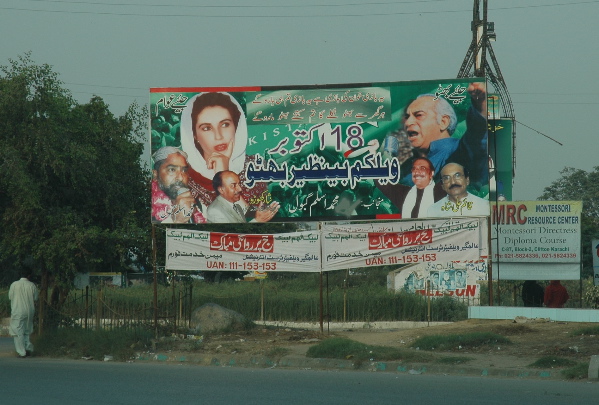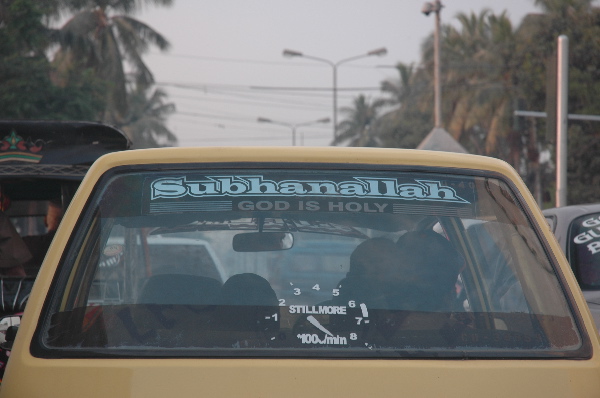Flying into Karachi, Pakistan, into an official State of Emergency, I didn't quite know what to expect. I was apprehensive to say the least. I had only applied for a tourist visa, so how was I going to explain the large microphone, the mini-disc recorder with a stack of blank discs, the two cameras, ten rolls of film – not to mention a folder of background information, suggesting my real intentions were far from just sightseeing?
I needn't have worried. A cursory glance at my passport, a couple of stamps and I was waved through. Far harder to avoid were the plethora of porters trying to coax my bags from me. Even once I'd dragged my pack to where the hotel driver was bringing the car around, a porter stayed at my side, perhaps expecting payment for his presence alone.

Even arriving in the middle of the night, downtown Karachi was luxury compared to anything I'd seen in Afghanistan. Forget roads paved with gold, the fact they were paved at all was appreciated. The hotel had power and the bathroom didn’t smell like an open sewer. The pillows were fluffy and had a mint on top. There might be a state of emergency going on outside, but I slept like a baby.
During the day I looked around the city. I hired a driver, Manuel, who was happy to take me exactly where he wanted to take me. I was shepherded from seemingly one tourist attraction to another, each designed to separate me from my money. "I don't want a camel ride on the beach," I insisted, moments before lurching across the sand on a dromedary's back. "I'd rather go to the local markets than this large tourist shop", I explained, emerging minutes later clutching bags of must-have souvenirs.

Everywhere we walked, beggars would follow, grabbing my elbow. Stopped at traffic lights adults and children alike, often nursing deformed limbs would tap on the car windows and hold out their hand.
Eventually Manuel had his turn too. "The car company pays me very poorly, so you can give me a tip. I am a Christian man and I have to buy many Christmas presents for my family." He turned up his nose at the US$20 I gave him for three hours driving. "This isn't very much money, and I have many Christmas presents to buy."
At least when you're being fleeced somewhere like Pakistan, it doesn't cost much.

The city is covered with political slogans, party symbols, colours and pictures of the likes of former prime ministers (and political hopefuls) Nawaz Sharif and Benazir Bhutto. At a large roundabout, a billboard still advertises Bhutto's October 18 rally, ended when a bomber attacked her convoy, killing an estimated 140 people.
The newspapers I read are entirely full of politics, and it's hard to see just what impact the state of emergency is having. Not a lot apparently, unless you are a politician or one of the ill-fated protesting lawyers. But there are certain signs. Geo TV has been forced off air for its reportage, though its journalists are allowed to protest the closure outside. Elections are planned for January 8, but under the state of emergency there will be no candidate debates, yet another measure allegedly designed to favour the party of President Pervez Musharraf.

The Pakistanis I speak to seem actually embarrassed by their leader, though rather like Lord Voldemort, they won't refer to him by name, at least not when the tape is running. They are strong believers in democracy, the rule of law and the constitution, and are keen to return Pakistan to a functioning democracy with a duly-elected leader. But they've also seen enough these past years to know that it's rarely that straight forward.
I meet with two local bloggers, who are happy to speak their minds both on and off line. (A full interview will be available in due course via public address radio). They are hospitable, generous and great conversationalists, as we continue talking from an upmarket coffee house surrounded by designer western clothing stores in one district, to more traditional (and delicious) food at streetside stalls. They tell me about the beggars I've seen, and say they are in fact a highly organised network, controlled 'mafia-style', and aren't real beggars. Those controlling them take them away from their families, and remove their limbs to make them more effective, they say, so I shouldn't be fooled into giving them money. Whatever the truth, it certainly doesn't seem like the one-armed man is having the last laugh.

After dinner my hosts depart for a wedding around 9pm, then pick me up again after midnight to take me to a friend's farewell, a young woman off to Dubai. We pull up outside a mansion, and the sounds of banging Pakistani/Indian dance music mixed with the worst of UK club hits must be audible blocks away. A bartender stands somewhat redundantly in front of a table stocked with non-alcoholic refreshments – Pepsi, 7-Up and Fanta, to be precise. The only white person in sight, sober as a judge and dancing to Kylie, I couldn't be more out of my element. And where exactly is this state of emergency?

Damian's visit to Pakistan is made possible with a grant from the Asia NZ Foundation. Thanks, Asia NZ.







